Fifth-wheel camper trailers are a popular choice for RV enthusiasts due to their spacious design and durability. If properly maintained, these trailers can last for decades, making them a worthwhile investment for frequent travelers.
What Is the Average Lifespan of a Fifth-Wheel Camper Trailer?
A fifth-wheel camper trailer is a popular choice for RV enthusiasts due to its spacious design and durability. On average, a fifth-wheel camper trailer lasts 15 to 20 years, but with proper maintenance and care, some can exceed 25 years. Several factors influence the lifespan, including build quality, usage frequency, and maintenance practices.
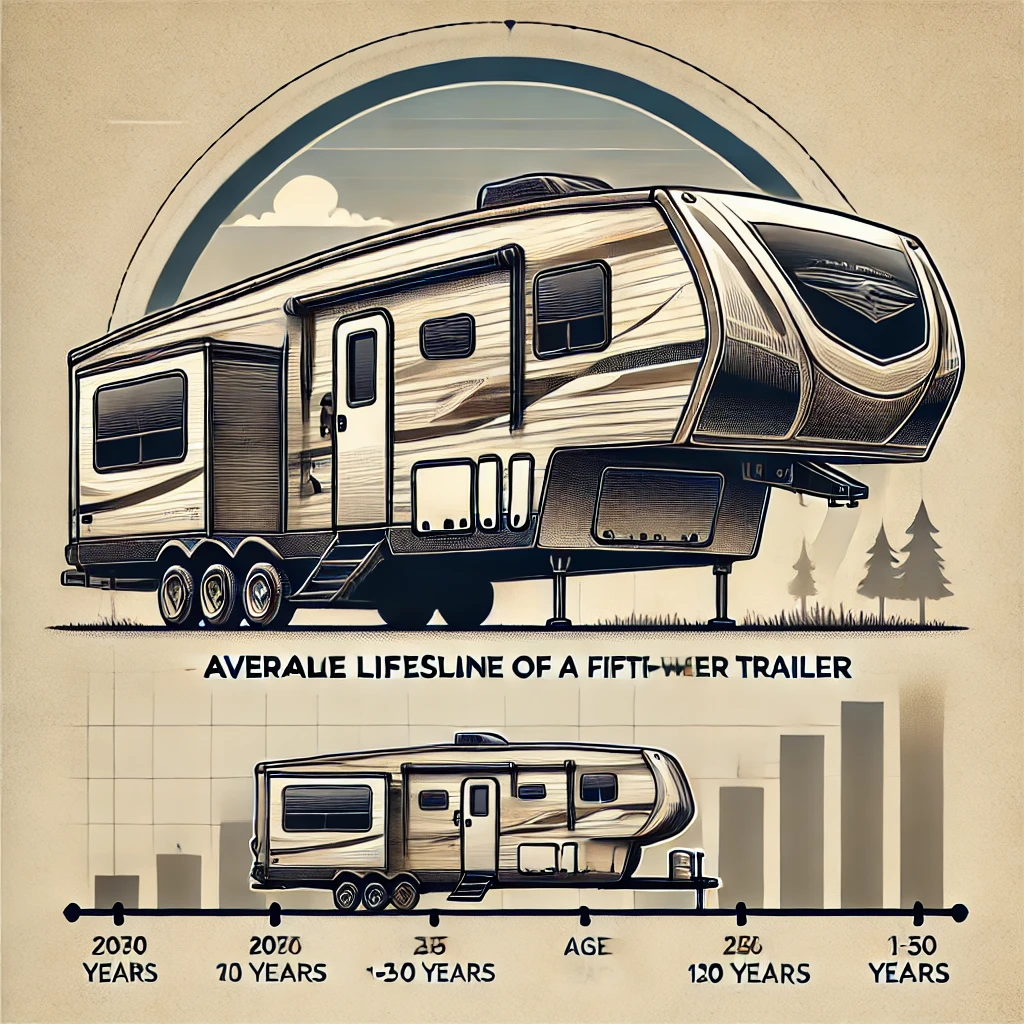
Factors Affecting the Average Lifespan
1. Build Quality
High-quality fifth-wheel camper trailers made with durable materials tend to last longer. Luxury models, for instance, often feature reinforced frames and premium finishes that withstand wear better than budget models.
2. Maintenance
Regular upkeep is crucial to extending the life of your fifth-wheel camper trailer. Tasks such as inspecting seals, maintaining tires, and servicing appliances can prevent costly damage and prolong its usability.
3. Frequency of Use
Frequent travelers may experience faster wear and tear, especially on tires, suspension, and interior components. However, occasional use without proper storage can also lead to deterioration.
4. Environmental Conditions
Exposure to extreme weather, such as heavy rain, snow, or intense sunlight, can cause fading, rust, and water damage. Using a weather-resistant cover or storing the trailer indoors helps protect it from the elements.
Tips to Extend the Lifespan
- Perform Regular Inspections: Check the roof, seals, and tires for any signs of damage.
- Store It Properly: Keep your trailer in a covered area or use a high-quality cover when not in use.
- Keep It Clean: Clean the exterior and interior after every trip to prevent dirt and debris buildup.
- Follow Manufacturer Guidelines: Stick to the recommended maintenance schedule for your specific model.
Fifth-wheel camper trailers are known for their durability, but their lifespan depends on several key factors. Understanding these factors can help you prolong the life of your fifth-wheel camper trailer and get the most out of your investment.
Build Quality of the Fifth-Wheel Camper Trailer
The construction quality plays a significant role in determining how long a fifth-wheel camper trailer lasts. High-end models with premium materials, sturdy frames, and top-notch craftsmanship typically have a longer lifespan.
- Chassis and Frame: Durable steel or aluminum frames resist corrosion and provide a strong foundation.
- Interior Materials: High-quality wood, laminate, and upholstery ensure the interior withstands wear and tear over time.
Maintenance Practices
Regular maintenance is essential to keep your fifth-wheel camper trailer in top condition. Neglecting upkeep can significantly reduce its lifespan.
- Roof Inspections: Inspect the roof for cracks or leaks to prevent water damage.
- Seal Repairs: Check and reseal windows, doors, and seams to avoid moisture intrusion.
- Appliance Care: Service the HVAC system, refrigerator, and other appliances to ensure long-term functionality.
Environmental Exposure
The environment plays a crucial role in how long your fifth-wheel camper trailer lasts. Constant exposure to harsh weather can cause premature wear.
- UV Rays: Prolonged sunlight exposure can fade exterior finishes and weaken seals.
- Moisture: Rain, snow, and humidity can lead to rust, mold, or structural damage.
Tip: Use a weather-resistant cover or store your camper in a garage or covered area to reduce exposure to the elements.
Frequency of Use
The more frequently a fifth-wheel camper trailer is used, the more wear and tear it experiences. However, occasional use without proper storage and maintenance can also cause deterioration.
- Full-Time Use: Trailers used for full-time living require more frequent maintenance due to continuous use.
- Occasional Use: Trailers stored for long periods should be properly prepped to avoid damage.
Road Conditions
The roads you travel on can impact your camper’s longevity. Poor road conditions can cause vibrations and structural strain.
- Smooth Roads: Lead to less wear on tires, suspension, and frame.
- Rough Terrain: Accelerates wear and may require more frequent repairs.
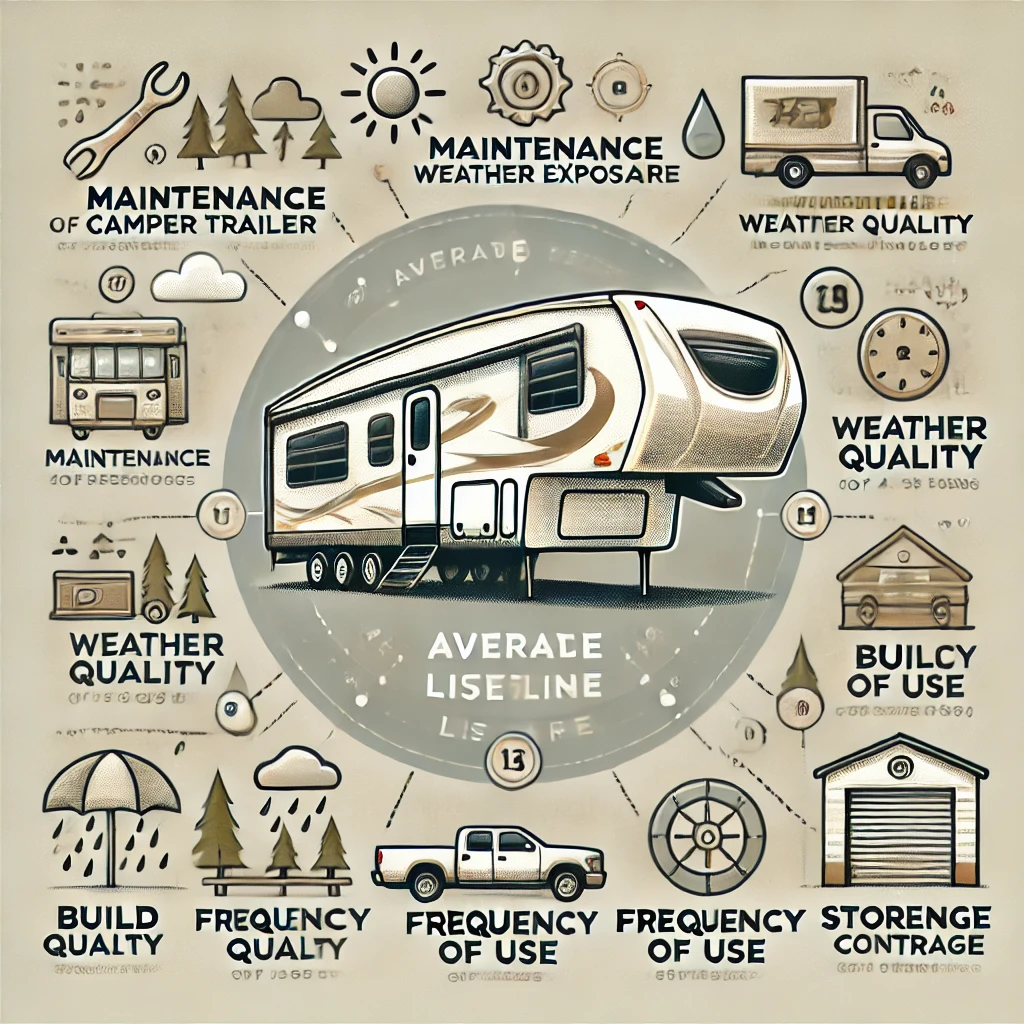
How Long Do Different Classes of Fifth-Wheel Camper Trailers Last?
Fifth-wheel camper trailers come in various classes, each offering unique features and durability. The lifespan of these trailers depends on their construction, maintenance, and usage. Let’s explore how long different classes of fifth-wheel camper trailers typically last.
Luxury Fifth-Wheel Camper Trailers
Luxury fifth-wheel camper trailers are built with high-quality materials and premium craftsmanship.
- Average Lifespan: 20–25 years or more with regular maintenance.
- Key Features:
- Durable aluminum or steel frames.
- High-end finishes like hardwood interiors and reinforced flooring.
- Advanced weatherproofing features.
Maintenance Tips for Longevity:
- Inspect luxury finishes regularly for wear.
- Keep high-tech appliances serviced to prevent costly repairs.
Mid-Range Fifth-Wheel Camper Trailers
Mid-range fifth-wheel camper trailers balance cost and quality, making them a popular choice for families.
- Average Lifespan: 15–20 years with proper upkeep.
- Key Features:
- Moderate-quality materials and construction.
- Basic weatherproofing with reliable but simpler appliances.
Maintenance Tips for Longevity:
- Regularly clean and reseal the roof and seams.
- Check and maintain suspension and tires, especially after frequent travel.
Budget Fifth-Wheel Camper Trailers
Budget-friendly fifth-wheel camper trailers offer affordability but may compromise on durability.
- Average Lifespan: 10–15 years with consistent care.
- Key Features:
- Lightweight frames and entry-level materials.
- Limited insulation and weatherproofing.
Maintenance Tips for Longevity:
- Protect against environmental damage by using a trailer cover.
- Address minor repairs promptly to avoid costly issues.
Full-Time Living Fifth-Wheel Camper Trailers
Fifth-wheel camper trailers designed for full-time living are built for extended use.
- Average Lifespan: 20–30 years with continuous maintenance.
- Key Features:
- Reinforced construction to handle constant use.
- Enhanced insulation and robust appliances for all-season living.
Maintenance Tips for Longevity:
- Perform routine checks on the plumbing, electrical systems, and HVAC.
- Invest in high-quality tires and suspension systems for frequent travel.
Toy Hauler Fifth-Wheel Camper Trailers
Toy hauler fifth-wheel camper trailers include a garage space for transporting equipment and vehicles.
- Average Lifespan: 15–20 years, depending on usage.
- Key Features:
- Heavy-duty construction for carrying additional weight.
- Specialized flooring and garage doors to handle wear.
Maintenance Tips for Longevity:
- Ensure the garage area is cleaned and inspected for damage after every trip.
- Regularly check the axles and suspension due to the extra load.
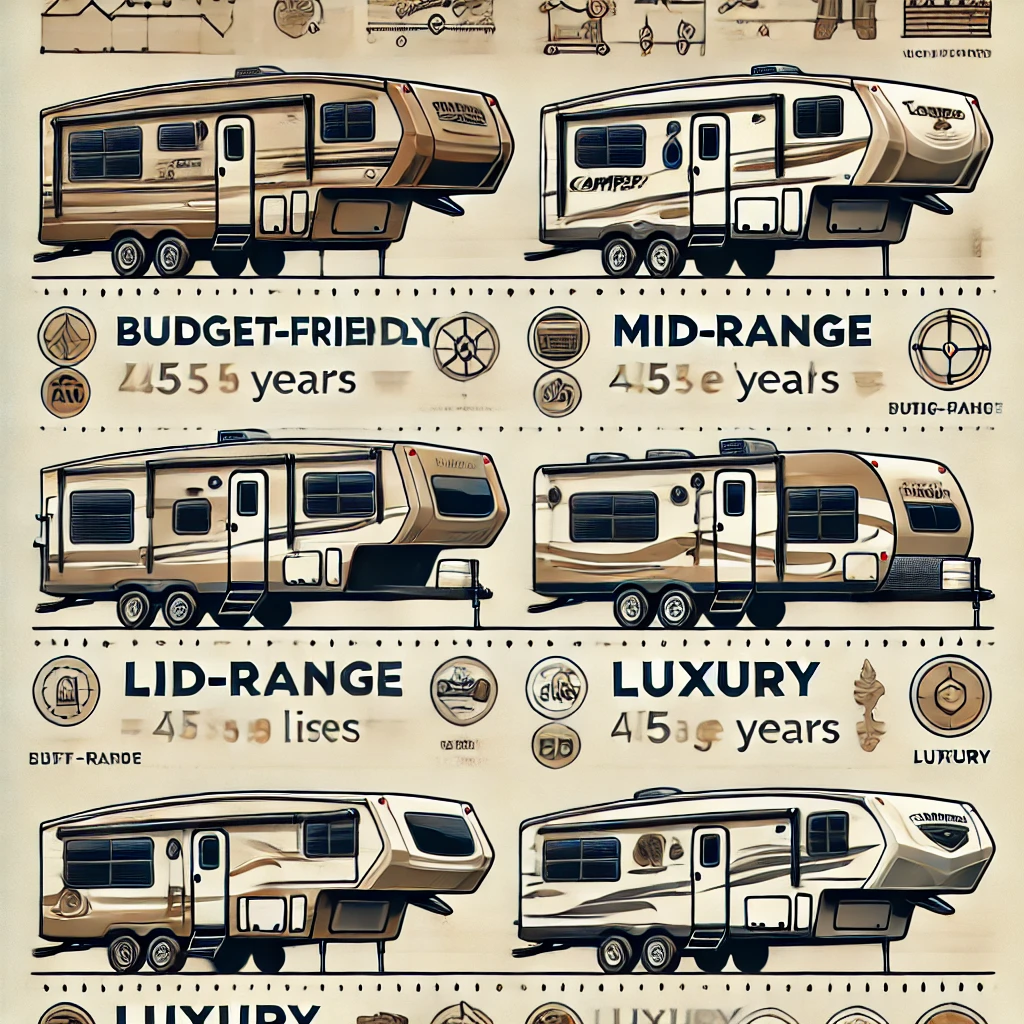
Common Mistakes with Fifth-Wheel Camper Trailers and Their Solutions
Owning a fifth-wheel camper trailer is a rewarding experience, but certain common mistakes can shorten its lifespan or diminish your enjoyment. Here’s a list of these mistakes and practical solutions to avoid them.
Neglecting Regular Maintenance
Mistake: Failing to perform routine inspections and upkeep can lead to costly damage over time. Issues like leaking seals, worn tires, or malfunctioning appliances are often overlooked.
Solution:
- Schedule regular inspections for the roof, seals, tires, and brakes.
- Perform seasonal maintenance to address weather-related wear.
- Follow the manufacturer’s maintenance guide to keep systems in optimal condition.
Overloading the Trailer
Mistake: Exceeding the trailer’s weight capacity can strain the frame, suspension, and tires, leading to potential safety hazards.
Solution:
- Check the Gross Vehicle Weight Rating (GVWR) and never exceed it.
- Use a scale to weigh your fully loaded trailer.
- Distribute weight evenly to maintain balance.
Improper Hitch Setup
Mistake: An incorrectly installed fifth-wheel hitch can cause instability while towing, increasing the risk of accidents.
Solution:
- Ensure the hitch is professionally installed and rated for your truck’s towing capacity.
- Regularly inspect the hitch for wear or damage.
- Adjust the hitch height for proper alignment with the trailer.
Ignoring Weather Protection
Mistake: Leaving the trailer exposed to harsh weather without protection can result in faded exteriors, cracked seals, and water damage.
Solution:
- Use a weatherproof cover when the trailer is not in use.
- Store the trailer indoors or under a carport if possible.
- Apply UV protectant to the exterior and inspect seals after every trip.
Skipping Pre-Trip Inspections
Mistake: Failing to check essential systems before hitting the road can lead to breakdowns or dangerous situations.
Solution:
- Inspect tires for proper inflation and signs of wear.
- Test lights, brakes, and turn signals.
- Ensure all items inside the trailer are secured to prevent shifting during transit.
Poor Storage Practices
Mistake: Improper storage during the off-season can lead to pest infestations, mold growth, and mechanical issues.
Solution:
- Clean the trailer thoroughly before storage.
- Use pest deterrents and dehumidifiers inside the trailer.
- Disconnect batteries and store them in a dry, temperature-controlled area.
Not Learning Proper Towing Techniques
Mistake: Driving a fifth-wheel camper trailer without proper training can result in accidents, especially when navigating tight turns or steep inclines.
Solution:
- Practice towing in open spaces to gain confidence.
- Use side mirrors and backup cameras for better visibility.
- Maintain safe speeds and follow proper braking techniques to avoid fishtailing.
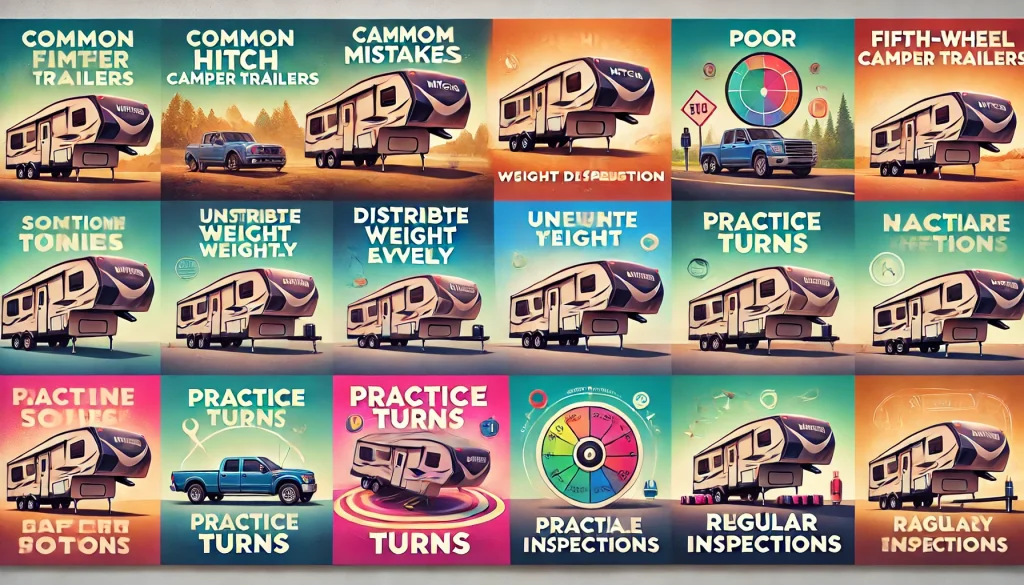
Tips to Extend the Lifespan of Your Fifth-Wheel Camper Trailer
- Perform Regular Inspections
Check the roof, seals, and tires periodically to catch and repair issues early. - Keep It Clean
Cleaning your fifth-wheel camper trailer after every trip prevents dirt and debris from causing damage. - Store It Properly
When not in use, store your trailer in a sheltered location or use a high-quality cover to protect it from the elements. - Follow Manufacturer Guidelines
Adhering to the manufacturer’s maintenance and usage recommendations ensures the trailer operates as intended.
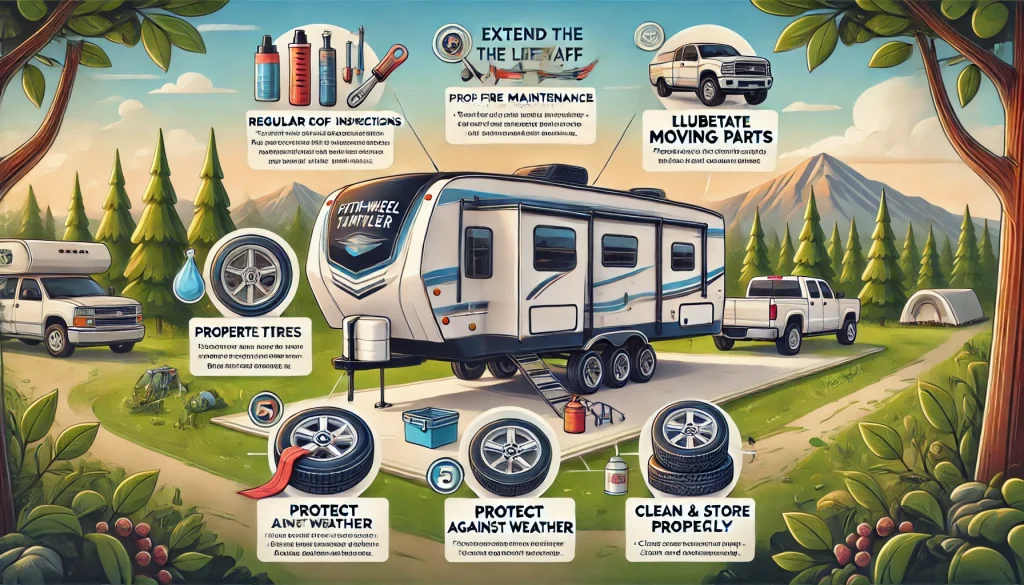
Key Steps to Increase the Lifespan of a Fifth-Wheel Camper Trailer
A fifth-wheel camper trailer is a significant investment, and proper care can ensure it lasts for decades. By following these key steps, you can maximize its lifespan while maintaining its performance and value.
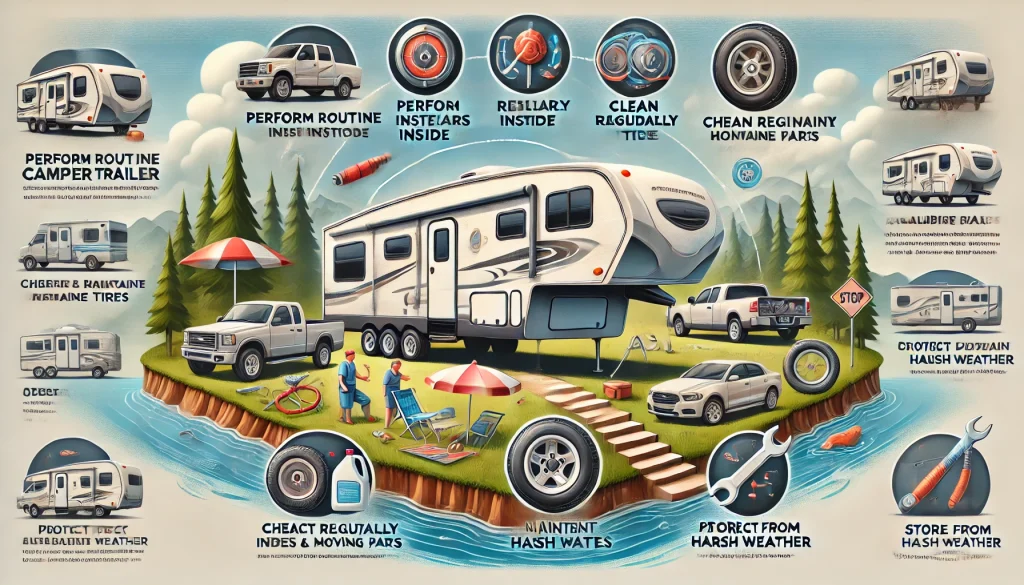
1. Perform Regular Inspections
Routine inspections help identify minor issues before they turn into major problems.
- Inspect the Roof: Check for cracks, leaks, or damage to seals.
- Examine Tires: Look for wear, proper inflation, and alignment.
- Inspect the Hitch: Ensure the fifth-wheel hitch is secure and properly aligned.
2. Maintain the Exterior
Protecting the exterior from the elements is essential to prolong its lifespan.
- Clean the Trailer: Wash off dirt, debris, and road grime after each trip.
- Wax and Protect: Apply wax or protective coatings to shield the surface from UV rays.
- Check Seals and Caulking: Reseal windows, doors, and roof seams to prevent water intrusion.
3. Keep the Interior in Good Condition
Preserve the interior to avoid premature wear and tear.
- Clean Regularly: Dust, vacuum, and wipe down surfaces to maintain cleanliness.
- Avoid Moisture Build-Up: Use a dehumidifier to prevent mold and mildew.
- Protect Upholstery: Use covers on furniture to reduce wear and stains.
4. Follow a Maintenance Schedule
Routine maintenance extends the life of critical systems and components.
- Service Appliances: Maintain the refrigerator, water heater, and HVAC system.
- Check Plumbing and Electrical: Inspect for leaks, damaged wires, or faulty connections.
- Grease Moving Parts: Lubricate hinges, slide-outs, and stabilizer jacks for smooth operation.
5. Store the Camper Properly
How you store your fifth-wheel camper trailer during the off-season impacts its longevity.
- Choose a Sheltered Location: Store indoors or under a covered area to protect it from harsh weather.
- Disconnect Batteries: Prevent battery drain by storing batteries in a temperature-controlled area.
- Stabilize Tires: Use tire covers and lift the trailer slightly to reduce pressure on the tires.
6. Drive and Tow Carefully
Towing practices can significantly affect your trailer’s condition over time.
- Avoid Rough Roads: Minimize travel on uneven terrain to prevent frame and suspension damage.
- Practice Safe Braking: Use a brake controller to reduce strain on the trailer and towing vehicle.
- Monitor Speed: Keep speeds moderate to reduce tire wear and improve fuel efficiency.
Final Thoughts
By implementing these steps, you can extend the life of your fifth-wheel camper trailer and ensure it stays in excellent condition. Regular maintenance, proper storage, and mindful towing practices are essential to preserving your investment for years to come.
More related details will be available on Flamingo Motorhomes.

